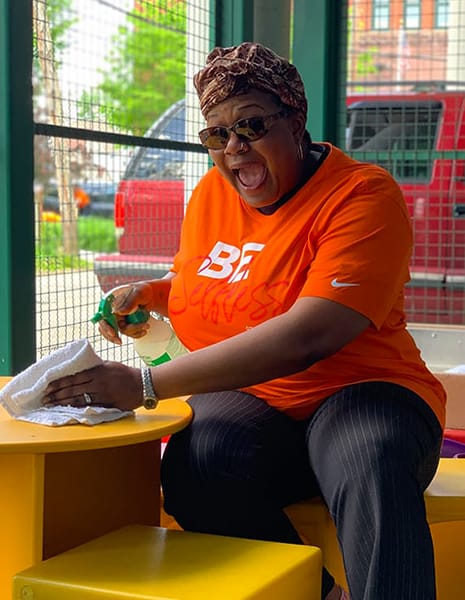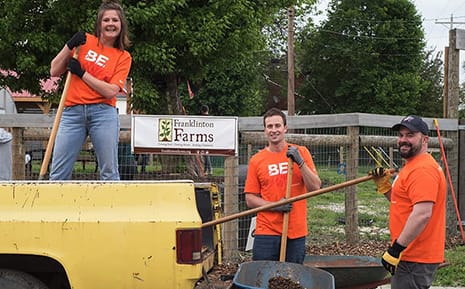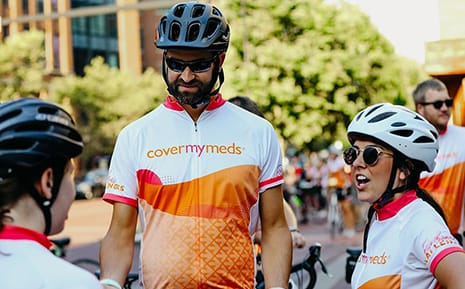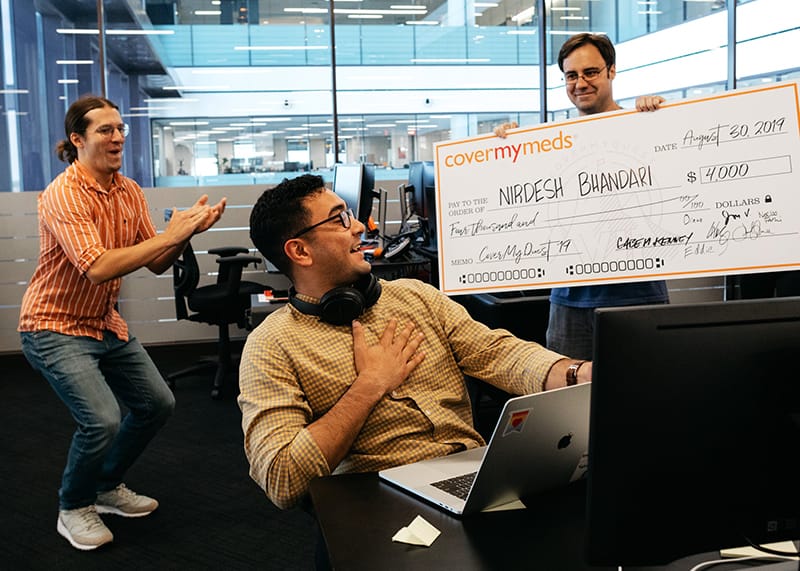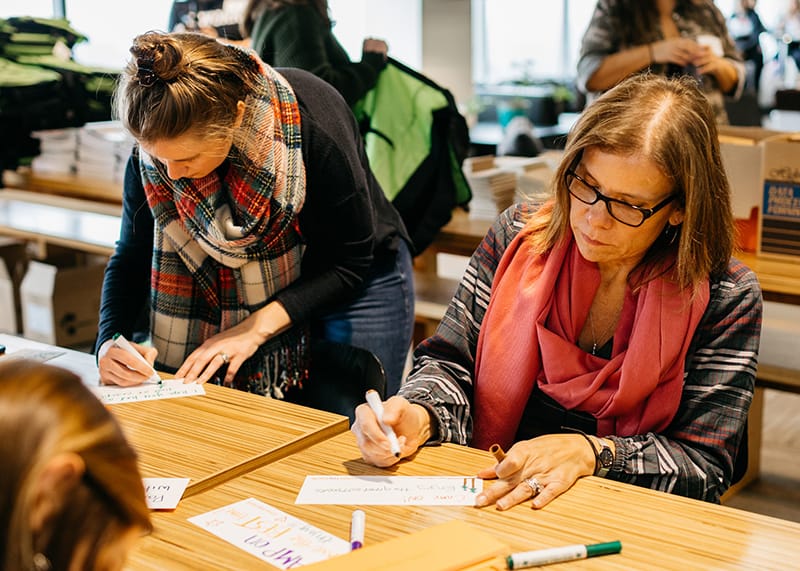
Meet Your Neighbor: CoverMyMeds’ Quality Management Team
“Quality management” may be a familiar phrase, but what does it mean? To find out, we sat down with three people on our quality management team — Susanne McKenzie, Taylor Thomas and Sheheryar Ahmad. Together, they’re responsible for ensuring CoverMyMeds has processes in place to satisfy client expectations and regulatory requirements.
For people in the corporate world, “quality management” may be a familiar phrase, but what does it mean?
Turns out, its exact definition evades even Merriam-Webster. But according to Investopedia, quality management is the act of overseeing all tasks that must be accomplished to maintain a desired level of excellence, including the determination of a quality policy, creating and implementing quality planning and assurance, and quality control and improvement.
We know, we know — that’s a lot of fancy-sounding words to wade through.
That said, the work CoverMyMeds’ quality management team does is crucial to our success as a company helping people get the medicine they need to live healthier lives. To break down the jargon and get a better understanding of who exactly our quality management team is, we sat down with three key people for a chat:
- Susanne McKenzie, manager, quality management
- Taylor Thomas, analyst, quality management
- Sheheryar Ahmad, analyst, quality management
Together, Susanne, Taylor and Sheheryar make up our quality management team in Columbus. A small-but-mighty bunch with counterparts in Scottsdale, Ariz., they’re responsible for ensuring CoverMyMeds always dots its Is and crosses its Ts when it comes to meeting and exceeding client expectations, regulatory requirements and more.
And, as you’ll discover, a couple of them are also enthusiastic about food. Now that’s something we can all understand.
What does our quality management team do?
Audits
Our quality management team supports three types of audits: regulatory, customer and internal. Audits are performed to ensure compliance with federal guidelines and contractual, financial and/or pharmacovigilance standards.
Quality Events
A “quality event,” or QE, can be many things (Editor: more on that soon), and they’re opened, investigated and documented by our quality management team to show clearly what immediate actions were taken to fix and prevent any further issues from occurring.
Process Improvements
Part of the quality management team’s mindset is to constantly look for ways to improve our company’s processes, systems and documents. If and when improvement opportunities are discovered, they work to address it.
How long have you been at CoverMyMeds and how’d you get the job?
Susanne: I joined CoverMyMeds in February of 2022. For the bulk of my career, I’ve worked for pharmaceutical manufacturers carrying out audits and compliance work. CoverMyMeds’ quality management team helps conduct client audits and regulatory inspections to reduce quality events (QEs) or potential adverse events (PAEs). We also help put formal processes and documentation in place.
Taylor: I started on Nov. 1, 2021, and I was the first employee on our quality management team in Columbus. Previously, I worked as a phlebotomist — someone who does your IV or draws blood — for a plasma donation company. In that role, I slowly worked my way up until I was the quality manager for my region. Then I moved to CoverMyMeds.
Sheheryar: I’ve been a quality analyst since April of 2022. I was previously the shared services project lead, responsible for PAE reporting and reconciliation as it relates to CoverMyMeds’ AMP: Access for More Patients program. We recently discovered PAE stuff fits better with the quality management team versus quality assurance team, so my current position evolved from that realization.
Wait, what’s a...
Quality event: A quality event, or QE, is an event in which a customer, regulatory or internal procedural requirement is not met or from which the requirement is deviated.
Potential adverse event: A potential adverse event, or PAE, is any undesirable experience — such as a headache — that’s associated with the use of a medical product in a patient.
All QEs and PAEs must be documented, reported and, if applicable, addressed through corrective actions.
Give me a glimpse of your typical 9-to-5. What does it look like?
Susanne: I spend many of my days in meetings, working with folks throughout the company who identify PAEs. I also work on active client audits, which require collaboration with our analytics, billing and sales teams to gather data and information to satisfy requirements. Since the quality management team is new to Columbus, I spend a lot of time educating and training employees on how to take advantage of our team’s expertise.
Taylor: Since we work closely with our counterparts in Scottsdale, my 9-to-5 is actually a 7-to-3. A typical, no-surprise day means lots of emails. I go through my inbox, address challenges from the day before, and then start reviewing open quality events. I also keep track of our quality event training — I’m the training captain, so to speak. I check the status of ongoing and upcoming audits, set up one-on-one meetings with account and operations managers to make sure they're prepared and address any outstanding observations.
Sheheryar: My daily job is unique because I’m still transitioning from my previous role as a shared services project lead, ensuring PAEs are reported appropriately and on time to manufacturers. I also provide support with PAE questions that arise related to AMP, assisting with reconciliations. With my analyst work, I help with quality event documentation. I primarily work on investigating and reviewing PAEs and developing a course of action to reach a resolution.
Getting people the medicine they need to live healthier lives is a major undertaking, and to do that, we need to remain compliant with pharmaceutical manufacturers and agencies like the FDA.
Why is quality management so important to healthcare?
Susanne: We demand high quality at CoverMyMeds — getting people the medicine they need to live healthier lives is a major undertaking, and to do that, we need to stay compliant with pharmaceutical manufacturers and agencies like the FDA (U.S. Food & Drug Administration) to maintain our license to operate. From a quality perspective, we always want to document quality events to help protect patient safety, as well. That’s a major part of our responsibility — it’s about patient safety, first and foremost.
Taylor: There’s not a company in the world without a quality management department. As far as the healthcare industry goes, quality is crucial. When you’re talking about medications people put in their bodies, quality counts. One completely innocent human error can lead to major consequences. We also want to help our clients maintain compliance with industry standards — we want to be a reliable partner that continuously provides excellent service and support.
Sheheryar: Quality management ensures we have a system in place for how we operate as a company. Part of our job is version control — making sure our front-line agents are properly equipped with up-to-date resources and materials. Regarding healthcare, quality management is important because we’re dealing with peoples’ health — we need to ensure patients are getting the correct medications and being properly counseled on their treatment plans. It all goes hand in hand.
If you could switch jobs with anyone at CoverMymeds, who would it be?
Susanne: Probably an operations manager. Operations managers interact with pod leads, front-line agents and case managers to manage calls, troubleshoot issues and oversee reconciliations. It’d be awesome to experience the ins and outs of their day-to-day processes — that insight would help me do my job as a quality management manager even better.
Taylor: Shey Jin, our senior manager of culinary operations! I don’t know Shey personally, but I always see her on campus. There was recently a power outage in Columbus, and Shey invited employees to bring their kids to campus to enjoy air conditioning and chicken nuggets. She’s so sweet and selfless. Also, my dad was a professional chef, so I love to cook — it’s in my blood.
Sheheryar: Probably somebody on our environments team. I’d love to see the new building before it’s done, or consult on the design of our fun, secret rooms on campus. I think it’d be a great way to share my creativity with everyone. I spent many hours growing up designing rooms on The Sims, so I’d love to take that experience to the next level.
If money wasn’t an object, what would you do with your life?
Susanne: I would love to open my own animal shelter. I love animals and I volunteer at a local cat cottage — Cozy Cat Cottage Adoption Center in Powell. It would be a no-kill shelter where animals can live in peace. If I had all the money in the world, that’s absolutely what I’d do.
Taylor: Cooking, definitely. I’d love to open a bakery or coffee place. My dad owned sports bars my entire life and my brother is as a sous-chef at a French restaurant in San Francisco. It’s a very demanding profession — long hours away from family, especially on the weekends. That's why my job at CoverMyMeds works so well for me and my family, but a girl can dream!
Sheheryar: Probably something related to traveling à la Anthony Bourdain. Eating food from local restaurants, meeting the people and experiencing their culture — it’d be an amazing experience. I try to visit three to four new states every year. I'm up to 23 now. Florida and California are my favorites, so far — I love anywhere with a beach.
Are you interested in a quality management career? Apply for an open position today.
